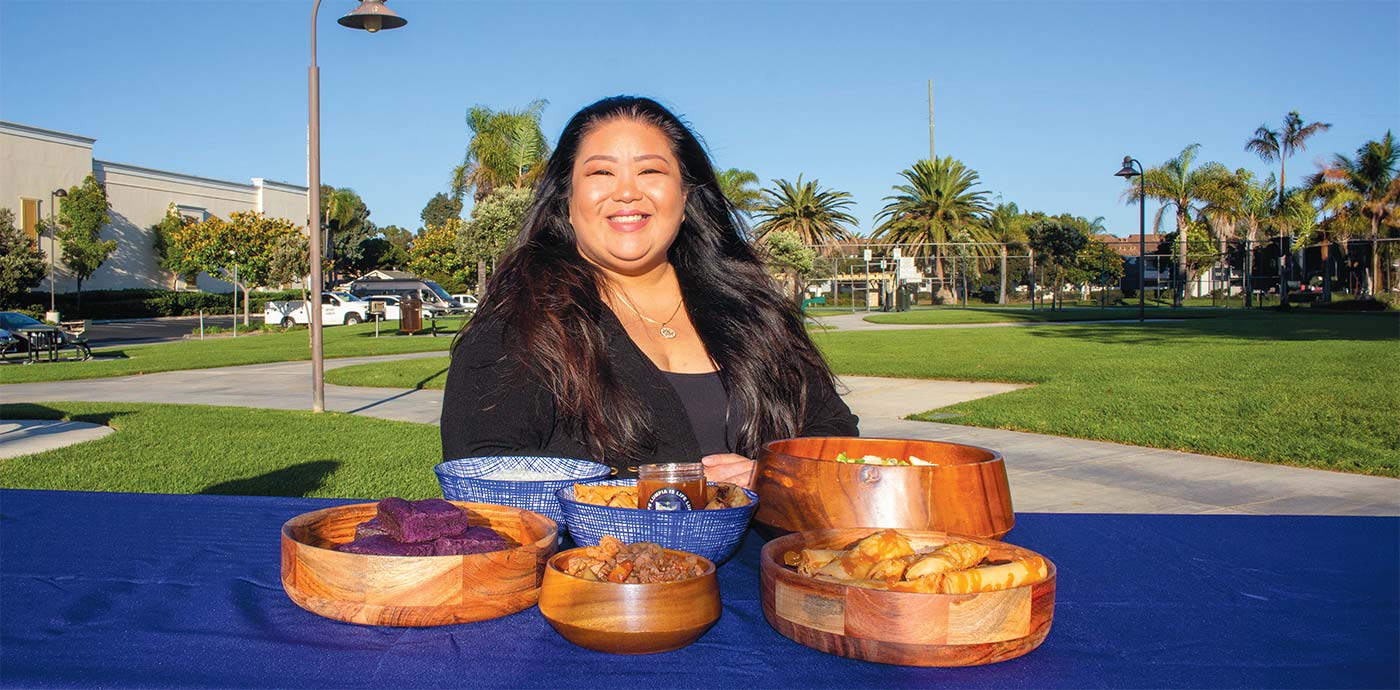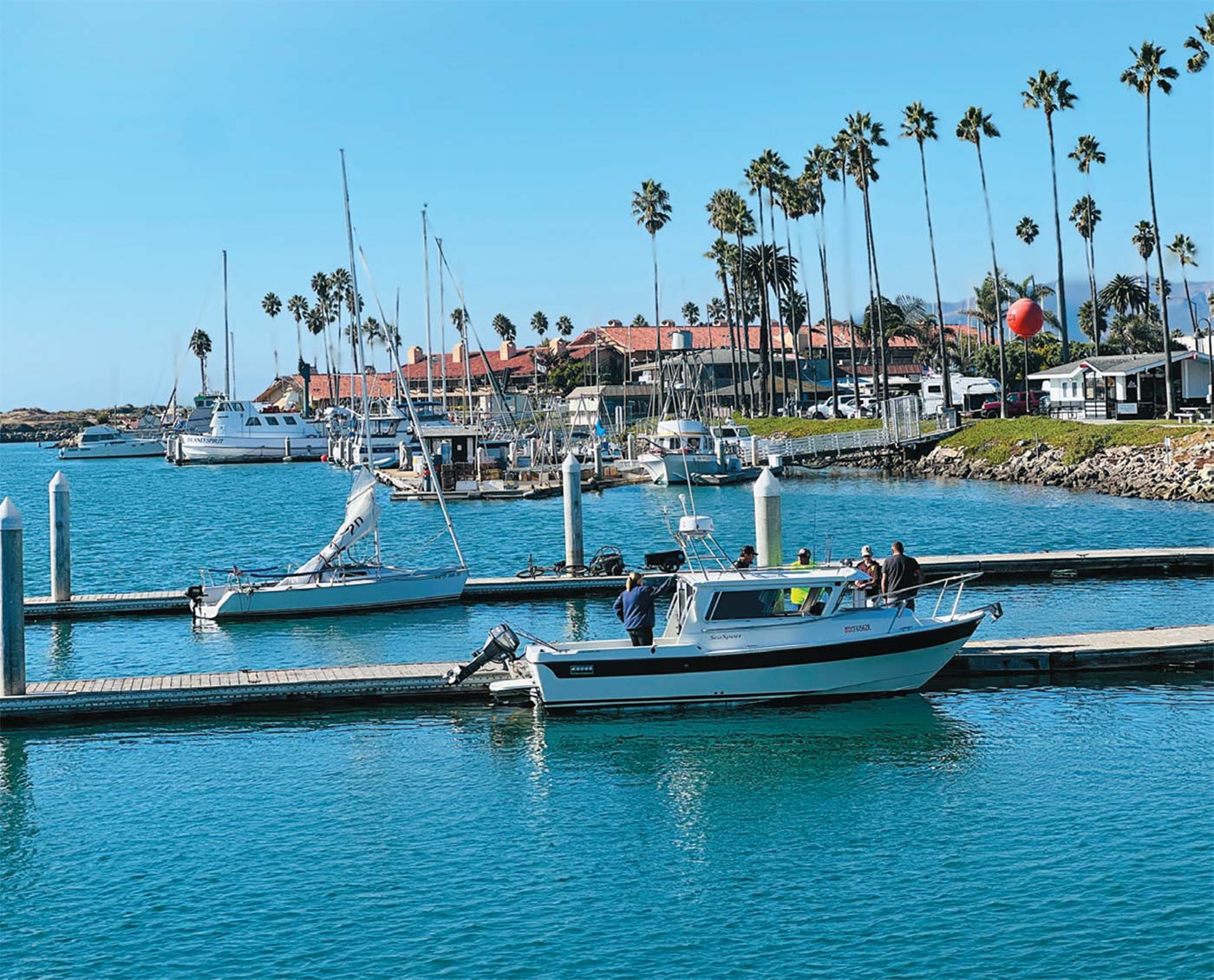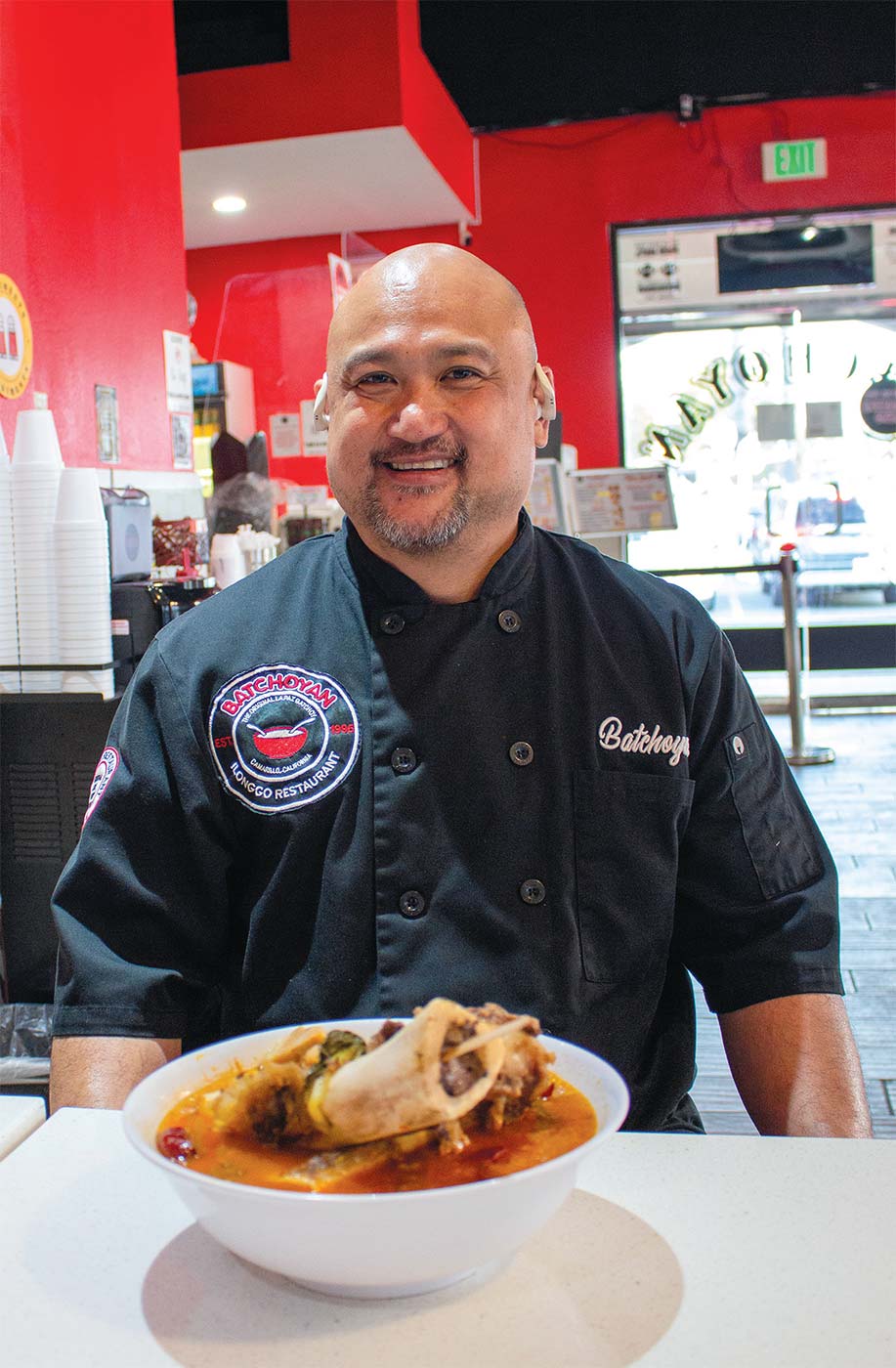KAIN NA!
With our enviable position in both the fertile Central Coast and the culinary melting pot of metropolitan Southern California, Ventura County has long offered an expansive setting for diverse food cultures to blend and evolve flavor. Although our region has been best known for seafood delicacies, recently Filipino chefs have quietly made their presence felt in our vibrant food landscape.
In recent years, neighboring Los Angeles County has witnessed an unprecedented surge in the popularity of restaurants serving the flavors of the Philippines, as the archipelago’s rich and diverse flavors captivate the palates of food enthusiasts and media critics. Now this same culinary wave is moving farther north.
From dishes deeply rooted in tradition to modern interpretations with a California twist, from family-run gems to bustling big-name spots, we delve into the growing Filipino food scene and discover the passionate chefs and food entrepreneurs spearheading this flavorful transformation.

Phyllis Masaya (above), the innovative owner of Masarap Lumpia, has been able to keep her business going for 14 years by adapting and shifting as needed, especially during the pandemic. She is now creating opportunities for other business owners to participate in pop-up markets and other events.
MASARAP LUMPIA
Redefining Food and Health
In May 2009, following her graduation from Cal State, San Marcos, Phyllis Masaya found herself facing a challenging job market in the midst of a chaotic economic downturn. Ventura County’s economic strain made her job hunt a fruitless and frustrating experience; months went by without callbacks or responses to her applications.
In November that year, after a desperate prayer, Masaya experienced a transformative dream: In it, her mother, Edita, who had passed away December 3, 2008, conveyed a powerful message: “Do what comes naturally to you.” She woke up with newfound clarity and determination, announcing “I’m rolling lumpia, and I’m going to sell it.” She named her business Masarap Lumpia, which means “delicious lumpia.” (Lumpia is a savory fried spring roll traditionally filled with meat, cabbage and other vegetables.)
Inspiration came from her mother’s background and culinary expertise. A caterer in Oxnard for many years, Edita left behind cherished recipes, often accompanied by handwritten notes. Masaya had learned wrapping lumpia from her mother, a skill she’d now employ in her venture.
In 2017, Masaya noticed a drastic shift in her energy level. Concerned, she sought advice and received a series of diagnoses, including diabetes, hypertension, high cholesterol, sleep apnea and various allergies.
Shortly thereafter, she watched a documentary about the American food industry that discussed the dangers of consuming excessive preservatives and animal products and was inspired to try a plant-based lifestyle. For Masaya, this turning point wasn’t just about dietary choices; it was about embracing a sustainable and holistic way of life. Whole foods, devoid of additives and preservatives, became the foundation of her new path, both in life and in business.
Over time, her menu expanded beyond traditional and vegan lumpia. Social media became the canvas to display her culinary creations and reach a wider audience. Her offerings gained popularity, and veganism became a central theme, which she skillfully incorporated into her culinary repertoire, including vegan desserts made with ube, a purple yam beloved in the Philippines: crinkle cookies, salted brownies, frosted cake and mini donuts. These creations earned acclaim as the “original vegan ube dessert box,” a unique blend of tradition and innovation, sold locally and shipped across the country.
Masaya’s evolution isn’t just a culinary journey; it’s a testament to resilience, inspiration and the power of following one’s heart. Rising from grief and adversity a culinary entrepreneur emerged, rewriting the story of food, health and community connection in Ventura County and beyond.
Masaya believes that authenticity in her work extends beyond her choice of ingredients and traditional cooking methods. A dish’s roots in Filipino culinary heritage carry significant weight, but she feels that cooking with love is a vital part of every dish she makes.
- For more on Masarap Lumpia and Phyllis Masaya follow @MasarapLumpia on Instagram.

In early November, Masarap Lumpia and event coordinators, Sama Ka Na, hosted a Filipino pop-up market at Portside Ventura Harbor that included over 20 Filipino-owned businesses with a variety of offerings, including street foods. According to Phyllis Masaya, owner of Masarap Lumpia, there were guests from Santa Barbara, Lompoc, Santa Maria, Ventura, Oxnard and Camarillo. It was so successful that the team has been given permission by Portside Ventura Harbor to host more events that are similar in the same location.
To participate in or attend future events, follow @MasarapLumpia on Instagram.

Chef Mike Dinulos, owner of Batchoyan Ilonggo, takes pride in the Filipino comfort food he makes. Knowing how food brings people together, he sees his restaurant as a place to enjoy the authentic Filipino flavors and culture.
BATCHOYAN ILONGGO RESTAURANT
Filipino Comfort Food in Camarillo
Throughout the recent ramen infatuation, other equally delicious noodle soups—including batchoy—have flown under the radar.
In Camarillo, Batchoyan Ilonggo is not your typical Filipino restaurant. It’s a place where authenticity meets passion, and where the regional flavors of the Philippines come to life. Michael Dinulos, owner, is the driving force behind this culinary venture.
“The uniqueness of our food arises from its strong ties to my homeland,” says Dinulos.
Although the restaurant offers an array of Filipino dishes that might be unfamiliar to some, the restaurant’s namesake dish, batchoy, steals the spotlight. This hearty noodle soup—made with pork offal, crushed pork cracklings, chicken stock, beef loin and rice noodles—is a comfort food beloved by Filipinos. Its origins can be traced back to La Paz, Iloilo City in the Philippines. Another popular dish is kansi lawas, a sour soup featuring bone marrow, jackfruit and vegetables.
Dinulos says that owning a restaurant, especially one representing his own country and region, fills him with immense pride. His roots in Filipino cooking trace back to his childhood, spent in the kitchen with his mother and grandmother. Dinulos’ love for cooking ignited a passion that eventually inspired him to enroll at Oxnard College’s culinary program. Eventually, he helped found his family’s culinary legacy in East Hollywood in 1995 with Ilonggo Delicacies—a shop and restaurant that closed during the pandemic.
Since its opening in October 2020, Batchoyan Ilonggo has drawn customers from far and wide, but rising costs have proved challenging. Nonetheless, Dinulos remained committed to keeping prices reasonable for his customers.
Over time, Dinulos has evolved his original batchoy recipe. He cut back on oil and introduced beef as an alternative protein for customers concerned about the original recipe’s pork, while preserving the authenticity of the original dish. Notably, he also portioned the liver into thicker slices, making it easier for customers who may be hesitant about liver to exclude it from their meal.
“Every bite is a journey back home, a reminder of the comforting flavors that bring people together,” said Dinulos. “It’s more than just a place to eat; it’s a place to savor the essence of Filipino culture and cuisine.”
- For more information on Chef Mike and his restaurant visit www.Batchoyan.com.
WHAT IS FILIPINO FOOD?
- A cuisine that’s a product of the nation of islands’ early trade with other Asian countries, followed by repeated colonization and the diversity of native populations.
- Food that—like its language—is a mixture of indigenous foodways and colonial influences
- Bold flavors, a similar emphasis on harmonious sweet/salty/sour tastes (and rice as the primary starch), as in many other Asian foodways, but with unique elements like fermented foods and souring agents, to name a couple.
- The subsequent evolution of Filipino American food adapted to North American ingredients and changing tastes.

The Seafood City Supermarket, a specialized place to shop for Filipino flavors, is very focused on participating with the local community.
SEAFOOD CITY SUPERMARKET
Unveiling Filipino Flavors in Oxnard
Editor's note: In the print edition, we mistakenly stated that the supermarket arrived in Ventura. It was meant to say Ventura County.
To introduce Ventura County to the rich and diverse flavors of the Philippines, Ventura’s newest Filipino supermarket, Seafood City, hosted a fall pop-up event featuring dishes from the Philippines and other parts of Asia. The response was overwhelmingly positive and fostered a number of crowd favorites, including dishes like sauced grilled balut (fertilized duck/chicken egg that is incubated for a period of time before cooking). The event’s popularity revealed that curiosity about Filipino culture is steadily growing in the county. The younger generation, in particular, is displaying an adventurous spirit when it comes to exploring new horizons, taking pride in discovering unique culinary experiences.
Mildred Smith, director of brand strategy and creatives for the market, emphasized the significance of a strong local presence when opening a new store. “Being in Oxnard, networking and connecting with the local community are crucial,” she says. “Our focus is on serving and actively participating in important collaborative community projects.”
The supermarket offers discounts for seniors, students and active or retired military personnel. “We’re deeply appreciative of the warm welcome we’ve received from Ventura County, so we’re eager to give back,” says Smith.
When asked about what inspired the brand to bring a Filipino supermarket to Oxnard, Smith says that the decision was influenced by both demographics and cultural trends. “We always target locations where there is a growing Filipino American population,” she explains. “We’ve noticed an interest in Filipino cuisine not only among the Filipino community but also among mainstream diners, including families and young individuals.”
Smith highlighted an active presence on social media platforms such as YouTube, Instagram and Facebook as part of the market’s efforts to connect with customers and share their journey. Beyond the digital realm, Seafood City’s store also houses its own bake shop along with independent Filipino food establishments Bakers Avenue and Grill City.
Anticipation is building for the arrival of renowned Filipino restaurant chains such as Jollibee, Chowking and Valerios—all within the Seafood City building—promising an even more diverse culinary landscape in Ventura County. In the meantime, these three businesses offer plenty of options, whether you are brand new to Filipino cuisine or you’re a seasoned diner ready to explore the culture’s rich and diverse array of dishes beyond lumpia and pancit.
When Filipinos tuck into a meal, we say “kain na” (kah-een nah)—“Let’s eat!” in Tagalog.
- For more information on Seafood City visit www.SeafoodCity.com.





